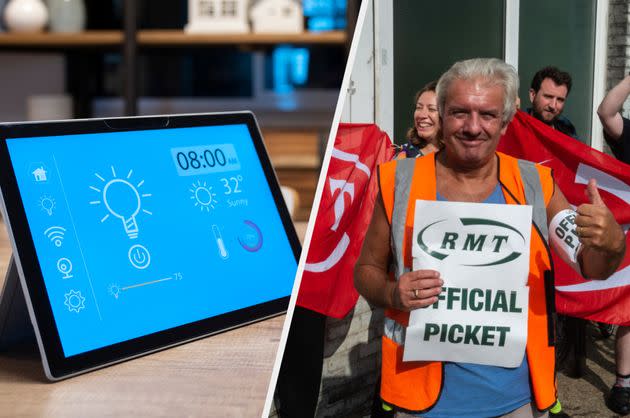Should We Nationalise Energy And Rail Companies?

Should we nationalise rail and energy companies? (Photo: Getty)
The rail strikes this year and fears over escalating energy bills are prompting a growing number of people to ask whether it’s time to nationalise rail and energy companies.
The controversial topic has been dropped by the Labour Party, but as concerns over workers’ wages in the cost of living crisis rumble on, movements such as Enough Is Enough are pushing for the state to take control of more assets.
Here’s what you need to know.
What is nationalisation?
Nationalisation is when the state, or government, takes control of a private company through its assets and operations.
It can happen in several different ways. A government could buy the majority of shares (50.1%) in a company, so it becomes the main shareholder – and the company does not have to agree to transfer ownership.
The government then pays compensation to previous owners. The state does not usually buy out an entire company completely.
A government can also take control of a company temporarily, through a bailout. Banks were saved from going under during the 2008 financial crash through government bailouts, through buying shares in it, providing money or loans.
Privatisation is the opposite: it’s when the ownership of a property is transferred from the government to another private company. This was a common occurance during Margaret Thatcher’s time in No.10.
What’s the current situation?
British Rail was privatised between 1994 and 1997, before being split into 17 regional organisations.
Now, some of the companies which own various UK rail organisations have been taken over by other countries. For instance, Arriva is owned by the German government’s national railway company, Deutsche Bahn.
However, some rail organisations have actually to privatisation, including ScotRail, Northern and Transport for Wales rail franchises are now run by the Scottish, UK and Welsh governments.
Energy companies in the UK are not nationalised at all, but are regulated by Ofgem.
Why should we nationalise?
There have been calls for the government to nationalise certain industries where a single firm can supply everyone with a particular product or service – therefore allowing consumers to get the best price.
When it comes to railways, it’s thought public ownership could reduce train fares, and that it makes sense as there is no “market” for which rail company you use – most people just get on the train which goes to the right station.
The TSSA union also released a scathing video attacking the way rail companies are privatised and benefitting other states this week.
This is an eye opener pic.twitter.com/PMplLC75cc
— Valerie Farrington 💙 (@Valhalla51) August 17, 2022
Nationalisation has become a hot topic around energy companies ever since the energy price cap was lifted in April.
After all, oil and gas giant BP announced it made £7 billion profits between April and June this year – while energy bills are set to climb to £3,582 this October.
Former prime minister Gordon Brown called for the temporary nationalisation of energy firms if the companies cannot offer lower bills to consumers.
He also called for the energy price cap to be cancelled, and compared the situation to the 2009 banking crisis when some banks were nationalised to protect customers.
Unite general secretary Sharon Graham also agreed, saying: “Selling off our energy sector to the private profiteers has ended in tears.”
She added that “a piecemeal approach won’t work”.
Why shouldn’t we nationalise?
There are fears the government’s decisions with these nationalised companies could be called into question, as they may act more in line with their political agenda than the consumers’ best interests.
Organising director of the TSSA union, Luke Chester, told Radio 4′s Today programme that rail workers were actually able to reach an agreement with one rail company because it was not controlled by the government.
He’s looking for a pay rise which reflects the pressures of the cost of living crisis, job security, and guarantees that terms and conditions of working will not be “ripped up”.
He claimed 15 rail operators had been told by transport secretary Grant Shapps that they are unable and have no mandate to make an offer to strikers.
With Merseyrail, TSSA secured a 7.1% deal.
“The reality is that Merseyrail is not controlled by the department for Transport. And that’s the difference – they were able to make an offer,” Chester said.
Some believe private companies are more efficient too, because they’re competing and so seek more efficient ways to sell their products to their clients.
Nationalised companies could struggle for money if they come up against other government departments, too.
Are politicians considering nationalisation?
The Conservatives were accused of renationalising the rail network when Shapps reorganised Great British Railways last year, but have not mentioned taking over any energy companies even amid the cost of living crisis.
Labour have promised not to nationalise water, energy or rail companies.
The shadow chancellor Rachel Reeves said the 2019 mass nationalisation policy helped to secure the party’s “worst results since 1935”.
Labour leader Keir Starmer explained that they had no plans to nationalise any energy companies when he unveiled the party’s latest cost of living support plan.
He told BBC Breakfast: “The chose we’ve made in our plan is that every single penny that’s needed for this plan will go directly to reducing the bills of families up and down the country.
“If you go down the nationalisation route, then money has to be spent on compensating shareholders.
“And I think in an emergency like this, a national emergency where people are struggling to pay their bills, I think the right choice is for every single penny to go to reducing those bills.”
The Green Party, however, has called for the five big energy firms to be nationalised.
This article originally appeared on HuffPost UK and has been updated.

 Yahoo Movies
Yahoo Movies 